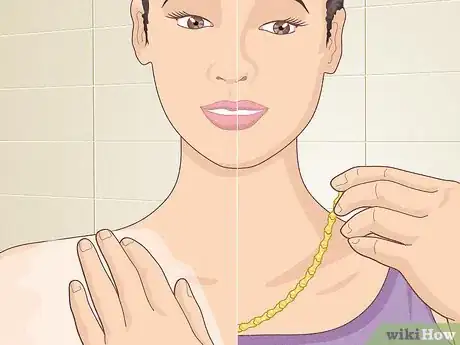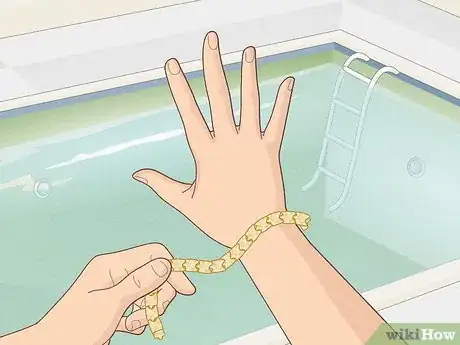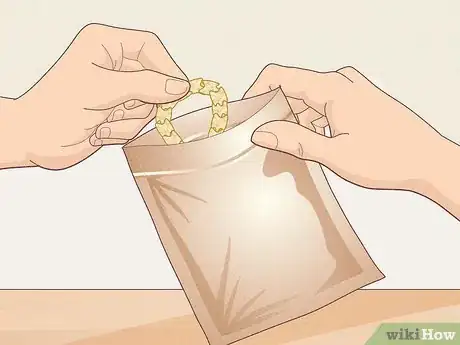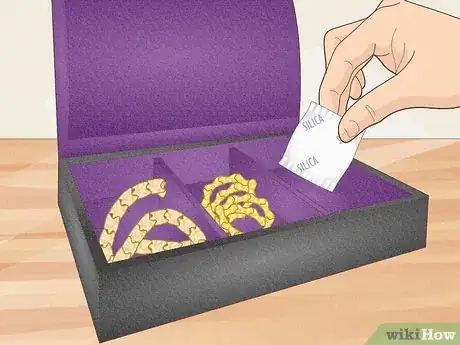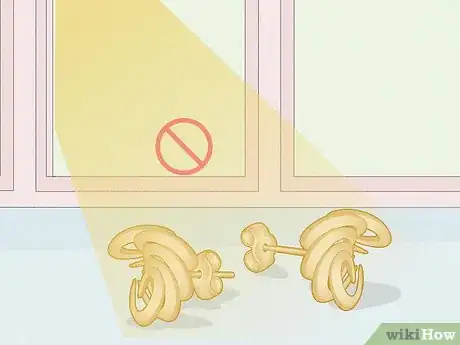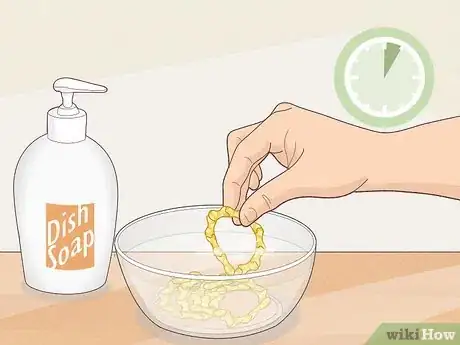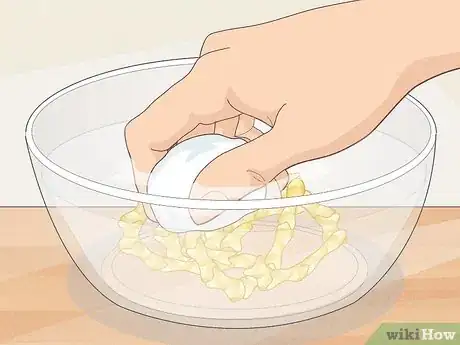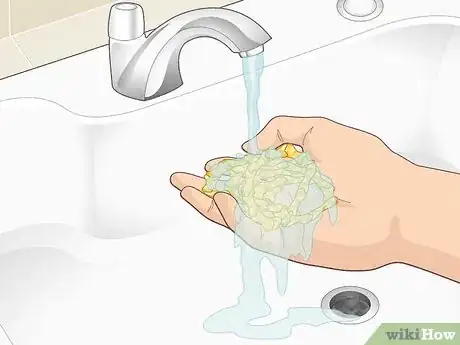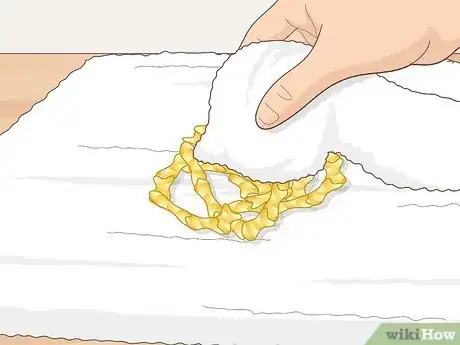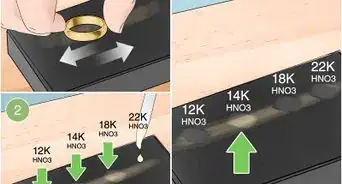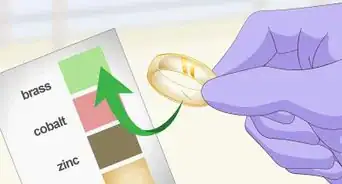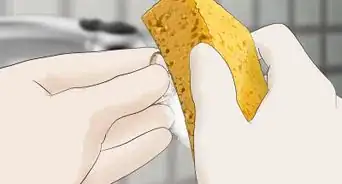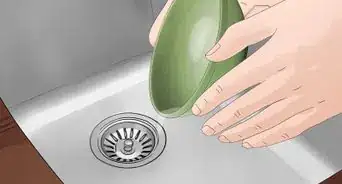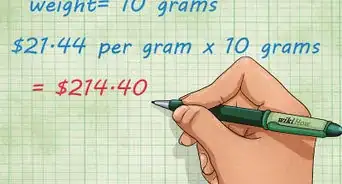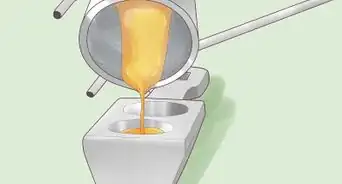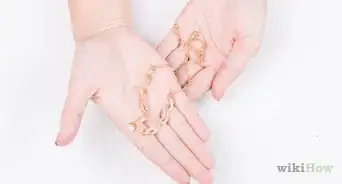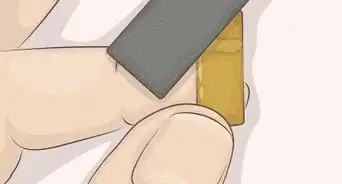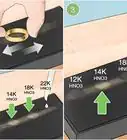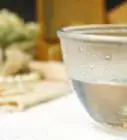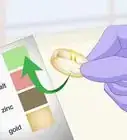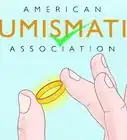This article was co-authored by Edward Lewand. Edward Lewand is a Graduate Gemologist & Accredited Appraiser with over 36 years of experience in the jewelry industry. He completed his residency in graduate gemology at the G.I.A. in 1979, New York and now specializes in Fine, Antique and Estate Jewelry, consultations and expert witness work. He is a Certified Appraiser of the Appraiser Association of America (AAA) and an Accredited Senior Appraiser (ASA) of the American Society of Appraisers In Gems and Jewelry.
There are 9 references cited in this article, which can be found at the bottom of the page.
This article has been viewed 23,658 times.
If you’ve worn gold-plated jewelry before, you know what a great investment these pieces are—you get the shine and sparkle without the expense of pure gold. Because of the thin coating, though, these pieces tend to tarnish more quickly than other types of jewelry. Thankfully, there are some excellent practices to follow that’ll keep your gold-plated jewelry looking shiny and fresh! With a few routine changes and a quick-cleaning process, your gold-plated jewelry will be less likely to tarnish.
Steps
Best Practices
-
1Let scents and lotions dry before putting on gold-plated jewelry. The chemicals in these kinds of products make gold plating fade over time, and the oils can gunk up a piece and make it lose its shininess. So when you get ready in the morning, put on your perfume, cologne, or lotion first, and let it dry for a few minutes. Once that’s done, accessorize![1]
- If you use a lot of hand lotion throughout the day and wear gold-plated rings, try to remember to take the rings off before putting on the lotion.
-
2Take off gold-plated jewelry before swimming or exercising. Both chlorine and sweat make gold-plated jewelry tarnish more quickly. Make it a point to remove your jewelry before jumping in the pool or going for a run to prolong its lustrousness![2]
- Keep a small, soft bag with you in case you need to store your jewelry while you’re out and about.
Advertisement -
3Keep plain pieces of gold-plated jewelry in resealable plastic bags. Air leads to tarnishing, so push the air out of the bag as you seal it closed. To keep items from getting tangled, use a separate bag for each piece of jewelry.[3]
- For added protection, slip a sheet of anti-tarnish paper into the bag along with the jewelry.
-
4Wrap jewelry with pearls and opals in fabric so they can breathe. Either a fabric bag or box would work well for these types of pieces.[4] Make sure to keep them separate from other pieces so they don’t knock into each other and get scratched.[5]
- It might sound like a lot, but once you get used to the proper way to care for your jewelry, it’ll become second nature.
-
5Place anti-tarnish strips in along with your jewelry to prevent tarnishing. You can find these products online or from most jewelry stores. Simply slip a strip into any bags or boxes that hold your gold-plated jewelry. The strip reduces the humidity in the container and prevents tarnish.[6]
- Remember, moisture and air are the main culprits that cause tarnishing. Anything you can do to cut back on these elements helps.
-
6Add a silica packet to your jewelry box to absorb excess moisture. Keeping your gold-plated jewelry as dry as possible is super important. All you have to do is toss a small silica packet into your jewelry box to reduce the moisture content.[7]
- There’s no need to buy new silica packets for your jewelry box! Just reuse one that came in a vitamin bottle, purse, shoebox, or some other purchase.
-
7Store gold-plated jewelry away from sunlight and heat. While it might be fun to display those dazzling gold earrings, too much heat or sun exposure will tarnish the gold plating. Put your jewelry in a box and keep that box somewhere it won’t come into contact with direct heat.[8]
- Double-check that your jewelry isn’t too close to a heating vent.
Cleaning Tips
-
1Soak your gem-free jewelry in warm, soapy water for 5 minutes. If your jewelry contains gemstones or pearls, skip to the last step in this section. To clean gem-free jewelry, fill a small bowl with water and swish around a few drops of mild dish soap. Then, gently lower your jewelry into the bowl and set a timer for 5 minutes.[9]
- You can also use a commercial cleaner made specially for gold-plated jewelry. Double-check that the product is safe to use on gold objects before using it.[10]
-
2Scrub away grime with a soft, clean cloth. Tougher tools, like a bristled brush, will scratch the gold coating, which is the last thing you want! Simply rubbing the piece all over with the cloth should be enough to remove built-up oil and dirt.[11]
- You can use a new, soft toothbrush to gently scrub the jewelry, if you'd like.[12]
-
3Rinse the jewelry with clean water. Either swish the jewelry through a bowl full of fresh water or carefully rinse it under running water in the sink. Check that all the suds are gone from any settings or crevices in the piece.[13]
- If you’re rinsing your jewelry over an open drain, put a washcloth on the bottom of the basin. This will block the drain and keep any dropped pieces from disastrously washing down the drain.[14]
-
4Lay your jewelry on a soft, clean towel to dry. If you want, pat the piece dry with a clean towel to remove excess water. Then, let it finish air-drying on a clean towel. Try putting pieces with settings at an angle or upside down so that water can drain out of them.[15]
- Make sure the piece is completely dry before putting it away. Lingering moisture corrodes gold-plated jewelry and makes it tarnish quickly.
-
5Clean pieces with pearls and gemstones with a soft, dry cloth. Don’t soak the pieces. Instead, wipe them down thoroughly to remove any dirt or grime. Once they’re clean, set them on a dampened cloth. Once the cloth is dry, you can put away the jewelry.[16]
- Pearls are porous and more prone to cracking if they get overly wet, which is why you should keep them away from water.
- You can also use cleaners made specifically for pearls if you’re dealing with an especially dirty piece.
Expert Q&A
Did you know you can get expert answers for this article?
Unlock expert answers by supporting wikiHow
-
QuestionWhat causes gold jewelry to tarnish?
 Edward LewandEdward Lewand is a Graduate Gemologist & Accredited Appraiser with over 36 years of experience in the jewelry industry. He completed his residency in graduate gemology at the G.I.A. in 1979, New York and now specializes in Fine, Antique and Estate Jewelry, consultations and expert witness work. He is a Certified Appraiser of the Appraiser Association of America (AAA) and an Accredited Senior Appraiser (ASA) of the American Society of Appraisers In Gems and Jewelry.
Edward LewandEdward Lewand is a Graduate Gemologist & Accredited Appraiser with over 36 years of experience in the jewelry industry. He completed his residency in graduate gemology at the G.I.A. in 1979, New York and now specializes in Fine, Antique and Estate Jewelry, consultations and expert witness work. He is a Certified Appraiser of the Appraiser Association of America (AAA) and an Accredited Senior Appraiser (ASA) of the American Society of Appraisers In Gems and Jewelry.
Graduate Gemologist & Accredited Appraiser
References
- ↑ https://www.afashionblog.com/how-to-prevent-gold-plated-jewelry-from-tarnishing/
- ↑ https://www.afashionblog.com/how-to-prevent-gold-plated-jewelry-from-tarnishing/
- ↑ http://www.dogearedwholesale.com/flyers/jewelrycaresheet-2sided.pdf
- ↑ http://www.dogearedwholesale.com/flyers/jewelrycaresheet-2sided.pdf
- ↑ https://www.frassanitojewelers.com/pub/media/wysiwyg/cms/jewelry/pearls.pdf
- ↑ https://perpetuadnajewels.com/wp-content/uploads/Treating-and-Preventing-Tarnish.pdf
- ↑ https://davidsuzuki.org/queen-of-green/how-to-reuse-silica-gel-packs/
- ↑ http://www.dogearedwholesale.com/flyers/Jewelry-Care-Sheet.pdf
- ↑ Edward Lewand. Graduate Gemologist & Accredited Appraiser. Expert Interview. 6 August 2020.
- ↑ http://www.cosmopolitanjewels.com/care_instructions.pdf
- ↑ http://www.cosmopolitanjewels.com/care_instructions.pdf
- ↑ Edward Lewand. Graduate Gemologist & Accredited Appraiser. Expert Interview. 6 August 2020.
- ↑ Edward Lewand. Graduate Gemologist & Accredited Appraiser. Expert Interview. 6 August 2020.
- ↑ https://youtu.be/YolZreLj5bs?t=103
- ↑ http://www.dogearedwholesale.com/flyers/jewelrycaresheet-2sided.pdf
- ↑ https://www.frassanitojewelers.com/pub/media/wysiwyg/cms/jewelry/pearls.pdf
- ↑ http://www.dogearedwholesale.com/flyers/jewelrycaresheet-2sided.pdf
- ↑ https://www.afashionblog.com/how-to-prevent-gold-plated-jewelry-from-tarnishing/
- ↑ Edward Lewand. Graduate Gemologist & Accredited Appraiser. Expert Interview. 6 August 2020.
